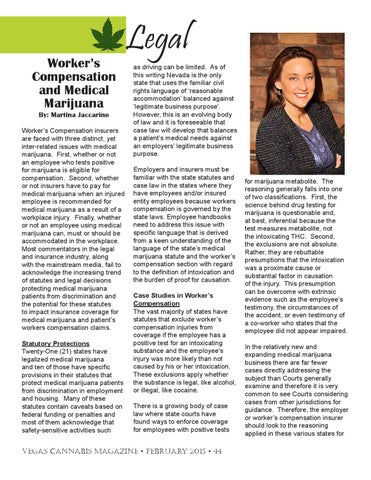Worker’s Compensation and Medical Marijuana By: Martina Jaccarino
Worker’s Compensation insurers are faced with three distinct, yet inter-related issues with medical marijuana. First, whether or not an employee who tests positive for marijuana is eligible for compensation. Second, whether or not insurers have to pay for medical marijuana when an injured employee is recommended for medical marijuana as a result of a workplace injury. Finally, whether or not an employee using medical marijuana can, must or should be accommodated in the workplace. Most commentators in the legal and insurance industry, along with the mainstream media, fail to acknowledge the increasing trend of statutes and legal decisions protecting medical marijuana patients from discrimination and the potential for these statutes to impact insurance coverage for medical marijuana and patient’s workers compensation claims. Statutory Protections Twenty-One (21) states have legalized medical marijuana and ten of those have specific provisions in their statutes that protect medical marijuana patients from discrimination in employment and housing. Many of these statutes contain caveats based on federal funding or penalties and most of them acknowledge that safety-sensitive activities such
Legal
as driving can be limited. As of this writing Nevada is the only state that uses the familiar civil rights language of ‘reasonable accommodation’ balanced against ‘legitimate business purpose’. However, this is an evolving body of law and it is foreseeable that case law will develop that balances a patient’s medical needs against an employers’ legitimate business purpose. Employers and insurers must be familiar with the state statutes and case law in the states where they have employees and/or insured entity employees because workers compensation is governed by the state laws. Employee handbooks need to address this issue with specific language that is derived from a keen understanding of the language of the state’s medical marijuana statute and the worker’s compensation section with regard to the definition of intoxication and the burden of proof for causation. Case Studies in Worker’s Compensation The vast majority of states have statutes that exclude worker’s compensation injuries from coverage if the employee has a positive test for an intoxicating substance and the employee’s injury was more likely than not caused by his or her intoxication. These exclusions apply whether the substance is legal, like alcohol, or illegal, like cocaine. There is a growing body of case law where state courts have found ways to enforce coverage for employees with positive tests
Vegas Cannabis Magazine • FEBRUARY 2015 • 44
for marijuana metabolite. The reasoning generally falls into one of two classifications. First, the science behind drug testing for marijuana is questionable and, at best, inferential because the test measures metabolite, not the intoxicating THC. Second, the exclusions are not absolute. Rather, they are rebuttable presumptions that the intoxication was a proximate cause or substantial factor in causation of the injury. This presumption can be overcome with extrinsic evidence such as the employee’s testimony, the circumstances of the accident, or even testimony of a co-worker who states that the employee did not appear impaired. In the relatively new and expanding medical marijuana business there are far fewer cases directly addressing the subject than Courts generally examine and therefore it is very common to see Courts considering cases from other jurisdictions for guidance. Therefore, the employer or worker’s compensation insurer should look to the reasoning applied in these various states for
